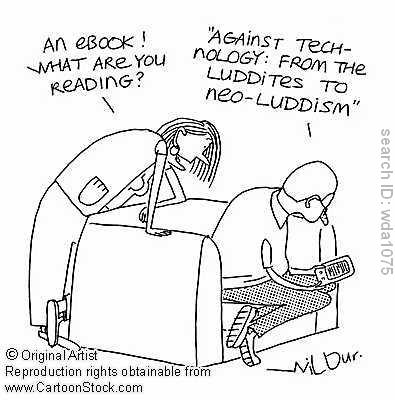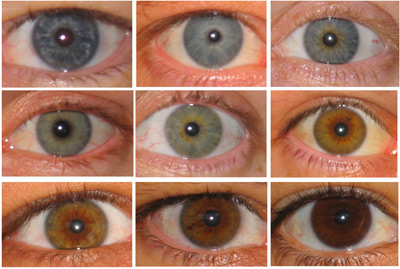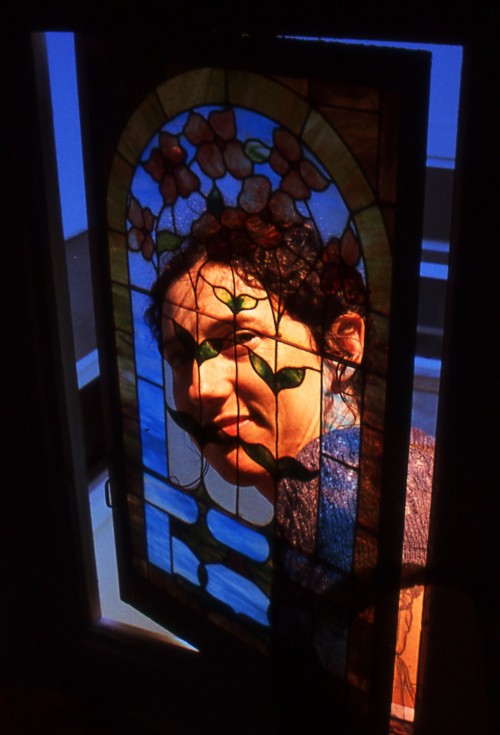Luddites were people too
The Luddites were a group of British textile workers in the 19th century who destroyed their newly automated mechanized looms. They were afraid of the advancement of technology and how it would impact their jobs.
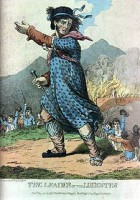 The Luddites derived their name from Ned Ludd. According to the mythology, in 1779, Ludd smashed two knitting frames, either because of a “fit of passion” or because he was lazy and didn’t want to work or because some kids were making fun of him.
The Luddites derived their name from Ned Ludd. According to the mythology, in 1779, Ludd smashed two knitting frames, either because of a “fit of passion” or because he was lazy and didn’t want to work or because some kids were making fun of him.
From then on, if a loom was destroyed and/or sabotaged, the workers would blame “Ned Ludd.”
By the time the Luddites formed in 1811, Ned Ludd was a mythological figure.
Ned Ludd may or may not have ever existed.
Ned Ludd may have been a lazy dude who didn’t want to fucking weave anymore, so he smashed his loom. And the Luddites named themselves after him. READ MORE >
Interview Roundup Part Five: Szymborska, Beah, Beattie, Derby, Cicero
 “I don’t believe I have a mission. Sometimes I really have a spiritual need to say something more general about the world, and sometimes something personal. I usually write for the individual reader–though I would like to have many such readers. There are some poets who write for people assembled in big rooms, so they can live through something collectively. I prefer my reader to take my poem and have a one-on-one relationship with it.” – Wislawa Szymborska, in the LA Times
“I don’t believe I have a mission. Sometimes I really have a spiritual need to say something more general about the world, and sometimes something personal. I usually write for the individual reader–though I would like to have many such readers. There are some poets who write for people assembled in big rooms, so they can live through something collectively. I prefer my reader to take my poem and have a one-on-one relationship with it.” – Wislawa Szymborska, in the LA Times
 “Recently I was giving a talk, and someone asked if I would ever write a romance novel. It was a funny question. But then I thought, well, okay, maybe. I come from a different culture and it could work to my advantage or disadvantage. What I consider romantic may not necessarily be what other people consider romantic. I’ve lived in this culture long enough to test some of the hypotheses of what romance is to me on a few people, and it hasn’t worked out quite that well [laughs]. For example, in the context of Sierra Leone, romance could mean a woman cooking for a man and sending a dish to the man’s house as a sign of showing that she cares and that she loves the man. Whereas in the West if you ask some women to cook for you, they may think otherwise—they may think you see them as belonging to the kitchen and that sort of thing.” – Ishmael Beah, in FSG Work in Progress
“Recently I was giving a talk, and someone asked if I would ever write a romance novel. It was a funny question. But then I thought, well, okay, maybe. I come from a different culture and it could work to my advantage or disadvantage. What I consider romantic may not necessarily be what other people consider romantic. I’ve lived in this culture long enough to test some of the hypotheses of what romance is to me on a few people, and it hasn’t worked out quite that well [laughs]. For example, in the context of Sierra Leone, romance could mean a woman cooking for a man and sending a dish to the man’s house as a sign of showing that she cares and that she loves the man. Whereas in the West if you ask some women to cook for you, they may think otherwise—they may think you see them as belonging to the kitchen and that sort of thing.” – Ishmael Beah, in FSG Work in Progress
“If I can see the landscape, I can put people in the world of the story. It’s very visual, even if it might not register that way with the reader (“Carleyville left late because of the rain.”) I have every texture and tone I need there-In the character’s name, in the alliteration of “left late”, and the rain . . . suddenly a very specific rain, for my story alone! Really, it was more than enough to begin. Yeah, I watch surfaces. In our house in Virginia, my husband hung a relief he’d carved on the living room wall (he is perverse: the room is charcoal grey; his relief of two intertwined figures is verdigris), and at a certain time of day, just for a matter of minutes, a shadow is cast and the peacock feathers (homage to Flannery O’Connor) in the vase above the bookcase make a strange foliage shadow that seems to suspend the real and reflected figures in a forest – but all the while, you know you’re looking at quickly changing shadows and reflections, as well as the original object.” – Ann Beattie in Folio
 “i don’t think that the internet has changed the way i write, necessarily, but it certainly has opened up a new set of possibilities for myself and other writers in terms of finding an audience, and i think that has had a pretty profound impact. when i started writing, there were very few feasible options in terms of publishing work, and even then, the feasibility was questionable. there was also a predictability – i wasn’t aware, then, of journals like conjunctions or grand street, and everything else was just too…agrarian. every lit journal i was exposed to was named after a tree, or an antique milliner’s tool, or something having to do with the ocean.” – Matthew Derby, in Identity Theory
“i don’t think that the internet has changed the way i write, necessarily, but it certainly has opened up a new set of possibilities for myself and other writers in terms of finding an audience, and i think that has had a pretty profound impact. when i started writing, there were very few feasible options in terms of publishing work, and even then, the feasibility was questionable. there was also a predictability – i wasn’t aware, then, of journals like conjunctions or grand street, and everything else was just too…agrarian. every lit journal i was exposed to was named after a tree, or an antique milliner’s tool, or something having to do with the ocean.” – Matthew Derby, in Identity Theory
 “I found out it is hard to talk seriously about anything to the media. Recently they filmed The Human War to be made into a movie. The movie will be out next year sometime, I don’t know when or where it will appear. I had several interviews with major media outlets, like newspapers, college newspapers, and the local news. I got asked for simple, little questions that meant nothing. At one point during the filming, one of the directors asked me to talk to an actor about a character, I mentioned Plato and everyone got weirded out. It is strange, society wants authors, authors who know things, society might even want philosophers, not sure. But they don’t want us to know things in public in front of everyone. This is probably what many conservatives dislike, that there are people in society that know things. Most people are scared of people who know things and are also scared of those things they know. I probably wouldn’t mention Sartre or Nietzsche or Richard Wright, I wouldn’t mention anything. I would say, “ROAD TRIP NOVEL” “MICHAEL CERA” “CHINESE” “LOOKING FOR ONE SELF.” They would be attracted to those words. I would be saying those words and phrases, thinking in my head, “These words mean nothing.” But they wouldn’t, those words would mean a million wonderful money making things.” – Noah Cicero, in Bookslut
“I found out it is hard to talk seriously about anything to the media. Recently they filmed The Human War to be made into a movie. The movie will be out next year sometime, I don’t know when or where it will appear. I had several interviews with major media outlets, like newspapers, college newspapers, and the local news. I got asked for simple, little questions that meant nothing. At one point during the filming, one of the directors asked me to talk to an actor about a character, I mentioned Plato and everyone got weirded out. It is strange, society wants authors, authors who know things, society might even want philosophers, not sure. But they don’t want us to know things in public in front of everyone. This is probably what many conservatives dislike, that there are people in society that know things. Most people are scared of people who know things and are also scared of those things they know. I probably wouldn’t mention Sartre or Nietzsche or Richard Wright, I wouldn’t mention anything. I would say, “ROAD TRIP NOVEL” “MICHAEL CERA” “CHINESE” “LOOKING FOR ONE SELF.” They would be attracted to those words. I would be saying those words and phrases, thinking in my head, “These words mean nothing.” But they wouldn’t, those words would mean a million wonderful money making things.” – Noah Cicero, in Bookslut
Ocularcentrism, storytelling, and the internet
In The Eyes of the Skin: Architecture and the Senses, philosopher and architect Juhani Pallasmaa mourns our ocularcentric culture. By ocularcentric, Pallasmaa means a culture made for the eyes, where sight dominates all other senses, where we experience the world through vision alone rather than an integration of all five senses. Pallasmaa argues that second to vision is hearing. The other three senses are ignored almost entirely. This is pretty radical, especially considering that he’s an architect, an occupation focused keenly on the visual experience. And yet, Pallasmaa argues:
Sight isolates, whereas sound incorporates; vision is unidirectional, whereas sound is omni-directional… Sight is the sense of the solitary observer, whereas hearing creates a sense of connection and solidarity. (49-50)
Reading Pallasmaa, I immediately thought of Walter Benjamin and his argument about the end of storytelling, how as a culture, we have lost our memory of oral narrative, which ultimately leads to an inability to communicate orally. Oral stories are grounded in the audio, but even more importantly, they offer a different way of thinking. To tell a story is an art. Whereas I can write novels and short stories galore, I am a terrible storyteller, by which I mean a terrible story-speaker. Why? It’s a way of thinking to which I am utterly unaccustomed. I have grown up in an ocularcentric world, where weight is put on the written word. What is written is powerful. It is permanent. What is spoken is ethereal. It is gone – and forgotten – as soon as it is spoken.
The Chemistry of Things: Shaping a Short Story Collection
I am trying to find the right shape for a short story collection. The more I try to put together a cohesive body of work, the more I realize that organizing a short story collection is a matter of chemistry, of finding the perfect combination of elements that will create new matter. Even though my collection is largely out of my hands at this point, the shape of it has been in flux. I’m also trying to figure out what work to collect for a second and third collection so I’m looking both forward and backward. I wish there was some kind of instruction manual for this. When I first began assembling my full length collection, I had no idea what I was doing. I still feel that way. Part of the problem is that I have a lot to choose from. I’ve been writing and publishing since 1999, using four different names. Most of my earlier work wouldn’t be appropriate for a collection of the sort I am trying to assemble but it’s still there and some of it still worth considering.
I keep coming back to the same questions. What stories should I include? In what order should I place the stories? Why am I making these choices? How do I want readers to feel while they’re reading the collection? And after? How do I make readers fall in love with the book? How do I make them see what I’m trying to say? On the one hand, I could arrange a collection by theme because there are a few dominant themes in my writing but would that make the collection too uneven, not diverse enough in tone? I could arrange a collection with stories that all have female narrators or male narrators or that are written in the first person or second person. I could take a kitchen sink approach (my first attempt) to try and demonstrate the range of my writing. I just don’t know.
What is Experimental Literature? {Five Questions: Miranda Mellis}
Miranda Mellis is the author of The Revisionist (Calamari Press); Materialisms (Portable Press at Yo Yo Labs); and None of This Is Real (forthcoming, Sidebrow Press). The Revisionist, illustrated by Derek White, has been translated into Italian and Croatian, was the subject of a 90-foot mural at Franklin Art Works in Minneapolis, and was short-listed for The Believer 2007 Book Prize. Mellis is a founding editor at The Encyclopedia Project and a recipient of The John Hawkes Memorial Fiction Prize, The Michael Harper Praxis Prize, The New Voices Sudden Fiction Prize, and an NEH Independent Research Grant. Her writing has appeared in Conjunctions, Harper’s, McSweeney’s, The Believer, Cabinet, Fence, Tin House, The Kenyon Review, Denver Quarterly, Context, Modern Painters, Post Road and elsewhere. She is a Visiting Assistant Professor at Mills College. She also teaches in the MFA Creative Writing program at the California College of the Arts, as well as the Language & Thinking Program at Bard College.
Good Mourning
November 10Struck by the abstract nature of absence; yet it’s so painful, lacerating. Which allows me to understand abstraction somewhat better: it is absence and pain, the pain of absence–perhaps therefore love?
I always get an innate pleasure out of reading Roland Barthes. To be fair, I haven’t read much of his early work in which he lays out his ideas on structuralism, but I did read & briefly obsess over Writing Degree Zero. However, I think it’s the later works, where some sort of self is revealed, that I find most pleasurable. Take the ubiquitous Camera Lucida, a text that, surely, enraptures a large number of readers: Barthes centers his ideas on a photograph of his mother in her youth, the entire text, the ideas, arrive at the reader from this starting point.
There’s an intellectually rigorous, yet somehow still very casual, sense of thought present in the work of Barthes. As a thinker, especially a thinker involved with the Tel Quel group & (eventually) post-structuralism, his writing is also remarkably lucid, simple even. Where Derrida, Deleuze & Guattari, Sollers himself can accurately be described as dense in their thoughts, the words on the page, with Barthes there’s a sense of breathing. Many of his books are also often less than 120 pages.
But this is not a trick– Barthes is not post-structuralism lite, and I don’t think anybody would imply this. But I guess that’s not the point here. A friend sent me a copy of the most recent of Barthes’s work to be translated, Mourning Diary. The book is a series of notes left almost daily by Barthes on note cards after the death of his mother. Barthes was remarkably close to his mother, and the death struck a very heavy blow.
March 10th, 2011 / 6:49 pm
Putting this here before I go somewhere: an interview with Zachary Mason about computational mythology, building art, AI, etc. ::::: help S. B./iamaparty.com build an infinite epic poem :::::: Errol Morris has got a new five party essay up :::::::: really dig this post on Snuff Film Aesthetics from Johannes ::::: Dennis Cooper’s blog has been great the last few days : bye
Giorgio Morandi & Daren Wilson
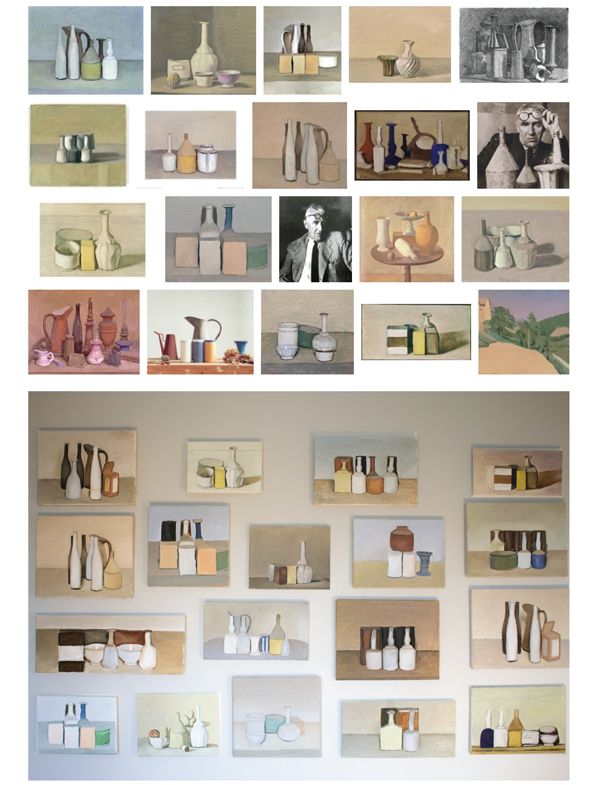
If you google image search “morandi” you’ll be searching for Giorgio Morandi, a relatively unsung Italian painter who spent his adult unmarried life living with his sisters in Bologna painting the same twenty or so objects for decades upon decades, obsessively rearranging them, emptying himself of bias towards the “subject” until the objects held no more importance than the unattributed space they resided in. When, it is said, they asked him why he never dusted the objects, he said that such furriness was visual time. I’m paraphrasing of course. Morandi is my favorite artist because of his faithful reticence, his solemn humor and patience. Daren Wilson is an artist who copies Morandi with an earnestness that seems to precede any postmodern tendency, hanging his paintings “salon” style in what seems to be his studio. I like Daren Wilson a lot. And so, it is both auspicious and odd how I, we, are here — looking at things that are real and not real. The representation of objects in oil; the representation of oil in pixel; the representation of space as contour; the representation of physical objects which we’ve accepted we’ll never touch. Touch your screen, I dare you.
round up: bell hooks, joseph p. wood, jubilat, gordon massman, lowercase letters, et al.

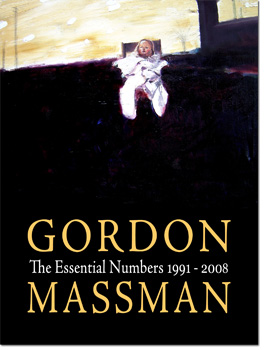 I picked up Gordon Massman’s The Essential Numbers 1991-2008 at AWP. Nobody told me to; I didn’t know that Blake had said things about it. Jesus, Mary, and Joseph. This is the most depraved-and-beautiful book of poems I’ve read maybe ever. I mean, Massman’s language forces me read every poem aloud (which is one of my gauges of good poetry); the sheer music of the language propels me down the page, and when I’ve finished every poem, I feel a little sick. I’m glad this book exists in the world. I’m not sure I’ll get through it. Here’s an interview.
I picked up Gordon Massman’s The Essential Numbers 1991-2008 at AWP. Nobody told me to; I didn’t know that Blake had said things about it. Jesus, Mary, and Joseph. This is the most depraved-and-beautiful book of poems I’ve read maybe ever. I mean, Massman’s language forces me read every poem aloud (which is one of my gauges of good poetry); the sheer music of the language propels me down the page, and when I’ve finished every poem, I feel a little sick. I’m glad this book exists in the world. I’m not sure I’ll get through it. Here’s an interview.
In the chapter on capitalization in The Copyeditor’s Handbook–I was just forced to buy a new one because I spilled grouper juice all over my tried-and-true copy; I bought it at Borders for a big-chunk discount because Borders is hightailing it out of my town–so, in this new copy, under the heading “Personal Names and Titles,” is a debate about capitalization. For fuck’s sake, people. If bell hooks or k.d. lang want their names lowercased, what’s the problem? Well, according to Amy Einsohn, who feels like my bff some days, Bill Walsh says this:
Sure, before “k.d. lang” there was “e.e. cummings.” But, as most good dictionaries…and New York Times style recognize, these are logos. The names are K.D. Lang and E.E. Cummings. To bow to the artists’ lowercase demand…deprives readers of a crucial visual cue…

